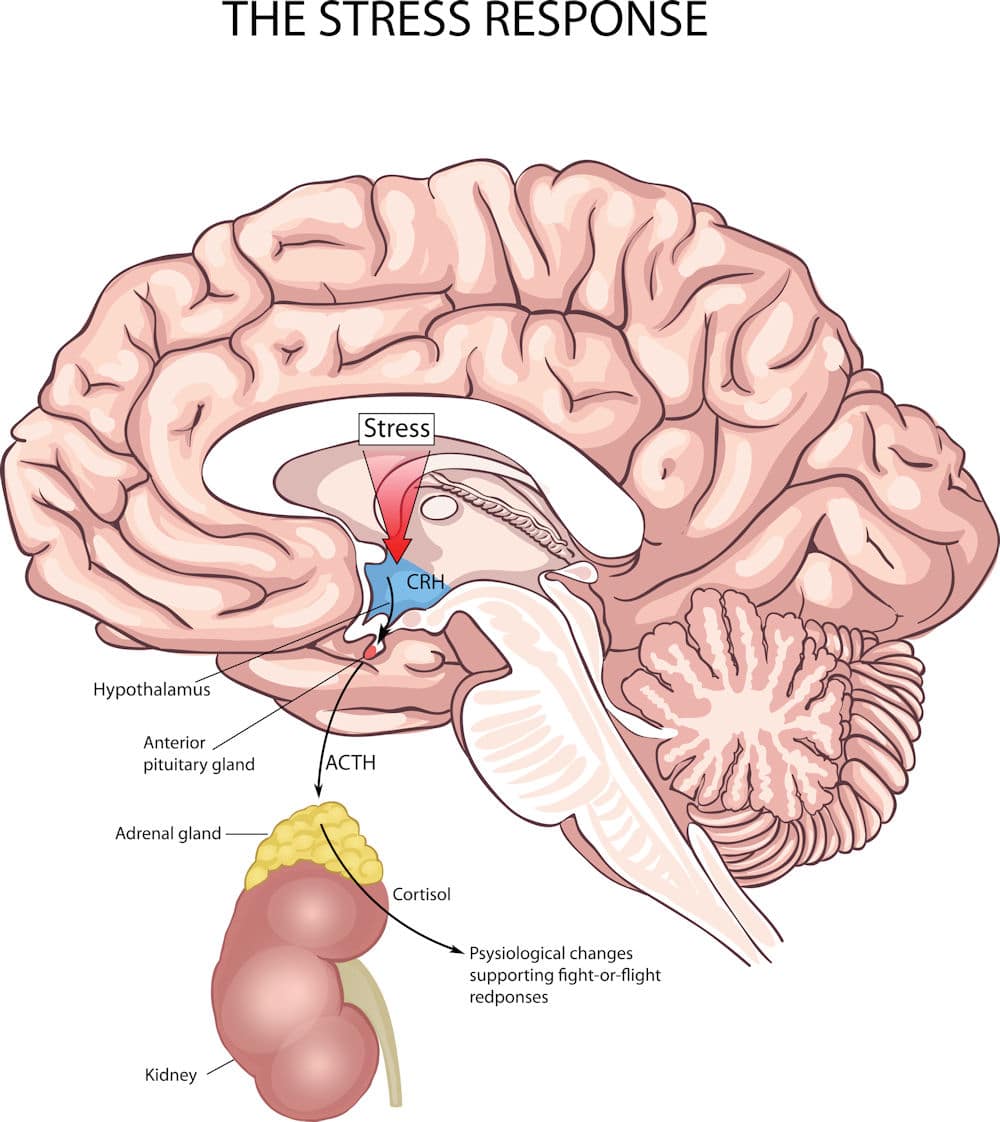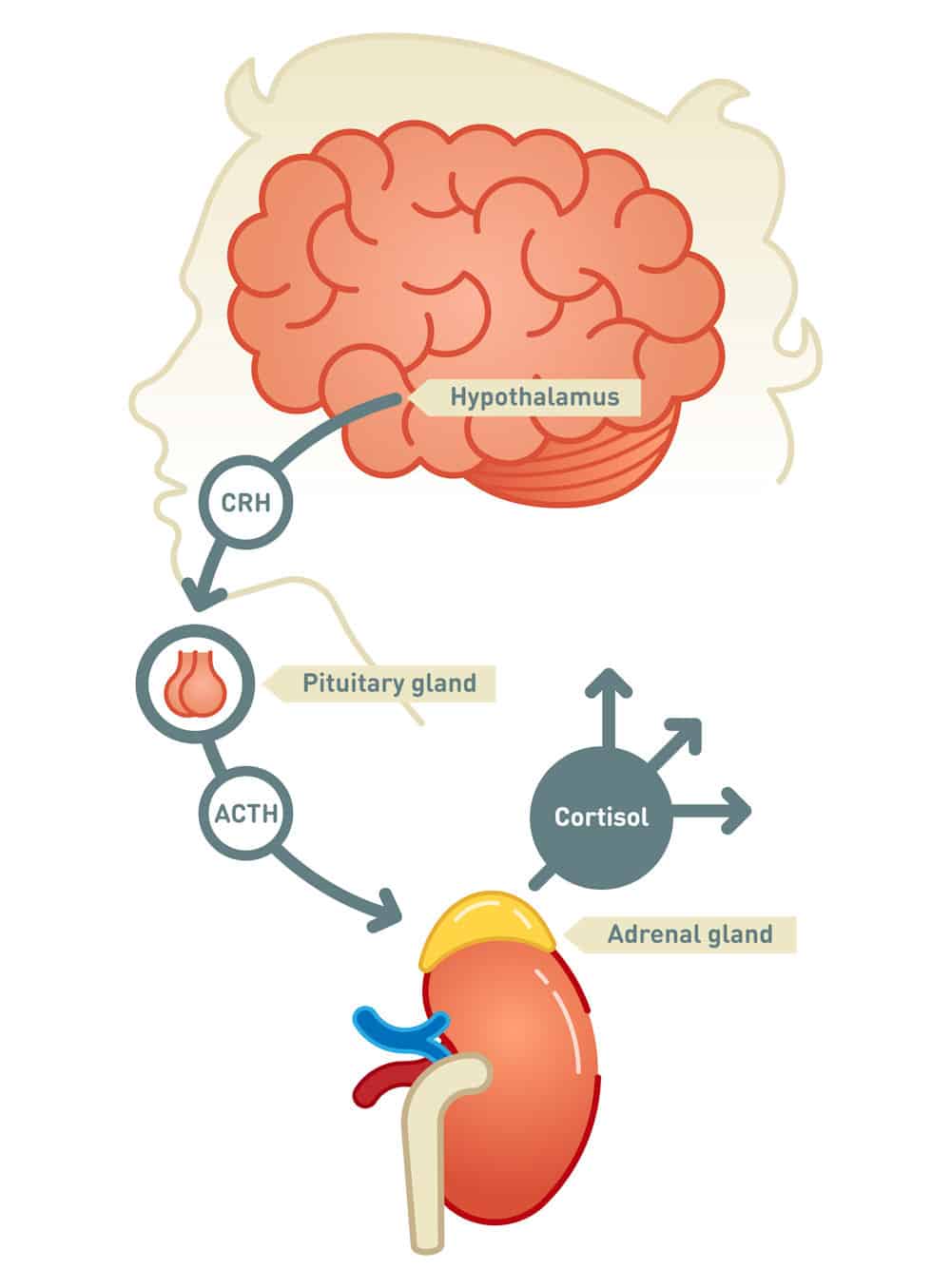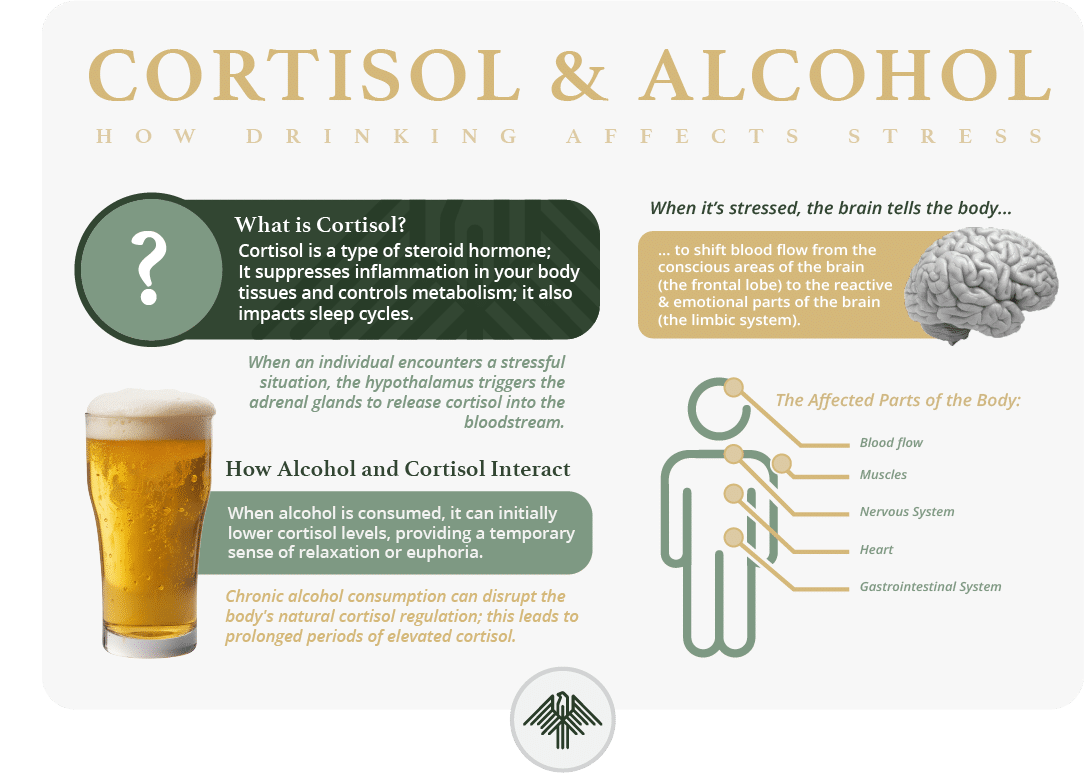One of the main reasons people go to after-work happy hours or have an extra glass of wine with dinner is to help them unwind. You have probably noticed that you drink more during stressful periods. And, in small quantities, alcohol can give you short-term stress relief because it’s a depressant.
However, it’s important to understand the link between stress, alcohol, and cortisol and its effect on you. It changes the balance of neurotransmitters (chemical messengers) in your brain. On the other hand, chronic alcohol abuse causes higher-than-average levels of the stress hormone, cortisol. And higher cortisol levels can lead to some unhealthy consequences.
At Eagle Creek Ranch Recovery in Nampa, Idaho, our team of addiction specialists has been examining the relationship between alcohol and cortisol levels. Based on evidence-based research and our findings, it has given our team the ability to effectively treat people with alcohol addiction and teach them how to cope with their stress and emotions in a healthy manner.
What is Stress?

Your body monitors your cortisol levels continuously to maintain steady levels to help your body maintain a physiological balance called homeostasis. Higher than usual or lower than usual cortisol levels can be harmful. Stress is part of your everyday life. It may be caused by less-than-ideal situations or perceived threats that promote feelings of:
- Depression
- Anxiety
- Fear
- Anger
- Guilt
When your body experiences stress or even perceives stress, it activates a variety of physiological and behavioral changes through the nervous and endocrine systems to reach the goal of maintaining homeostasis and dealing with the stress. Biologically speaking, there are several different kinds of stress including:
- Acute stress: You experience acute stress when you’re in sudden danger within a short amount of time. Barely avoiding a car accident or being chased by a bear are experiences that can cause acute stress.
- Chronic stress: When you experience ongoing situations that cause anxiety or frustration you are experiencing chronic (long-term) stress. Having a chronic illness or a frustrating job can cause chronic stress.
- Traumatic stress: Traumatic stress occurs when you go through a life-threatening event that causes fear and feelings of helplessness. Experiencing extreme weather events such as a hurricane, or enduring war or sexual assault can cause traumatic stress and may even lead to post-traumatic stress disorder (PTSD).
 What is Cortisol?
What is Cortisol?

Since cortisol is a type of steroid hormone, it suppresses inflammation in your body tissues and controls metabolism in your muscles, fat, liver, and bones. It also affects your sleep cycles. Cortisol is an essential hormone because it affects almost every tissue and organ in your body. It plays a part in:
- Regulating your stress response
- Controlling your body’s use of fats, proteins, carbohydrates, and metabolism
- Restraining inflammation
- Regulating blood pressure
- Regulating blood sugar
- Controlling your sleep-wake cycle
When you perceive a threat, a tiny area at the base of your brain sets off an alarm in your body. A combination of nerve and hormonal signals prompts your adrenal glands to release a flood of hormones which include adrenaline and cortisol.
What Causes Stress?
For individuals diagnosed with an alcohol use disorder (AUD), also known as alcoholism, tend to be at a higher risk for developing mental health issues. Stress is categorized into four different types, which are as follows:
General-life stressors include:
- Getting married or divorced
- Starting a new job
- Moving
- Problems at home
- A family member in poor health
- Death of a family member
- Problems at work or home
- Problems with a neighbor
Catastrophic/Fateful events include:
- September 11, 2001, or other terrorist attacks
- Natural disasters such as fires, floods, earthquakes, hurricanes
- Nuclear disasters
As a rule, studies show that alcohol consumption increases in the first year following a disaster. This includes both manmade and natural events. As time goes by, that relationship is diminished. Bear in mind that the research is focused on drinking only and not the prevalence of AUDs.
Mistreatment in childhood (the first 18 years of life)includes exposure to:
- Emotional abuse or neglect
- Physical abuse or neglect
- Sexual abuse
Studies usually show that mistreatment during childhood increases the risk for both adult and adolescent alcohol abuse including increased adult AUDs. However, the mistreatment of children is more likely to happen among children of alcoholics who frequently use poor parenting practices. In addition, parents with AUD pass along genes to their children which increases the child’s risk for AUD.
Stress can mount as a result of an individual’s minority status. Particularly as it relates to prejudice and discrimination. This type of stress may range from mild (such as being followed in a store) to severe (such as being the victim of a violent crime). It can also be emotional (harassment at work) or physical (hate crimes).
Furthermore, each of these categories is influenced in many ways by:
- Severity
- Duration
- Whether or not the stress was expected
- The type of threat (physical or emotional)
- The person’s mental health status (this includes any co-occurring conditions such as anxiety, other mental health disorders, or alcoholism)
The Effect of Alcohol and Cortisol on Stress
Your body has developed complicated and interrelated responses that are meant to ward off dangerous or harmful situations brought on by stress and to keep it in physiological balance. When you bring alcohol into this mix, it throws off your physiological balance. Alcohol causes higher amounts of cortisol to be released. This compounds the problem and puts you at an even greater risk for harm.
The issue with that is alcohol itself can cause stress on the body’s physiological balance. It may seem to offer some relief in the short term, but when the stressful events continue long-term, heavy consumption of alcohol can cause medical and psychological problems including the risk of developing AUD.
This ongoing stress, or chronic alcohol use, can impair your body’s ability to return to its original balance point. Your body then tries to achieve a new set point (a process called allostasis) of physiological functioning. Establishing a new balance point takes a toll on your body in terms of wear and tear, and it may increase the risk of serious diseases, including AUD. If your cortisol levels are consistently high or low, it can harm your overall health.
When faced with a stressful situation in the short term (such as a night of heavy drinking), your body’s normal physiological balance is changed, but it recovers quickly when the stressor is removed. If the stressor goes on over time (like long-term heavy drinking), the demands on the systems of your body are increased. This makes it harder to regain physiological balance. In response, your body then simply “resets” its balance point to a less favorable level of functioning.
Researchers studied the number of stressors that happen to a group of men and women in the general population to help understand how alcohol interacts with stress. They looked at how those stressors were related to alcohol use. The results of the studies found that both men and women who report higher levels of stress tended to drink more. It also showed that men tended to use alcohol as a way to deal with stress more often than women did.
In addition, for people who reported at least 6 stressful incidents, the percentage of binge drinking among men was about 1.5 times that of women. AUDs among men were also 2.5 times higher than the rate for women.
Veterans who have spent time in active combat have a high likelihood of turning to alcohol as a way to relieve stress. Fourteen to 22% of veterans who have returned from wars in Afghanistan and Iraq have been found to have PTSD, which has been linked to an increased risk for alcoholism also known as an alcohol use disorder (AUD).
Stress and AUD Recovery
The effects of stress don’t end once a person stops drinking. Newly sober individuals often relapse to drinking to relieve the symptoms of withdrawal such as:
- Feeling anxious
- Craving alcohol
- Sleeping problems
Long-term heavy drinking can alter the chemistry of your brain, causing your brain to reset what is “normal.” It brings on the release of higher amounts of cortisol. When the hormonal balance is shifted, it affects the way your body recognizes the stress and how it responds to it. A long-term heavy drinker might feel higher levels of anxiety when faced with a stressful situation than an individual who never drank or only drank moderately.
The Role of Cortisol
Cortisol also interacts with your brain’s reward or pleasure systems, in addition to being linked to negative or unpleasant feelings. It is believed that this might contribute to the reinforcing effects of alcohol. This may motivate the drinker to indulge in higher levels of alcohol to achieve the same effects.
Cortisol also plays a part in cognition which includes learning and memory. It has been found to especially promote habit-based learning and in turn, promote the development of habitual drinking, increasing the risk of relapse. Furthermore, cortisol has been associated with the development of:
- Psychiatric disorders such as clinical depression
- Metabolic disorders such as diabetes
Treatment for Alcoholism
A vital element for treatment is early screening. For example, a veteran who turns to alcohol to handle military stress and who has a history of drinking before joining the military is particularly at risk for developing problems. Screening for a history of alcohol misuse before being exposed to military trauma might also help recognize people at risk for developing increasingly severe symptoms of PTSD. By recognizing people with the highest risk for alcohol relapse during early addiction recovery from AUD, clinicians can help them address how stress affects their motivation to drink.
Treatment programs can then be created to focus on both the symptoms of the mental disorder and the alcohol dependence. Such treatment may include:
- Cognitive-behavioral therapy (CBT): In CBT, you learn how your inaccurate or negative thinking patterns have driven your behavior. You’ll learn how to cope with and respond to them more effectively.
- Exposure-based therapy: In exposure therapy, you confront the cues and triggers that cause feelings of stress but without the risk of danger. You learn to identify the cues and healthily manage the stress.
- Medications: Medications are being studied for alcoholism that helps stabilize the body’s response to stress. However, there are medications now that are effective in the treatment of AUD such as acamprosate which helps rebalance chemicals in the brain that may have been changed from drinking, and baclofen which helps reduce cravings.
The Answers You’re Seeking are at Eagle Creek Ranch Recovery
Eagle Creek is a recovery center set in the beautiful Treasure Valley of Idaho. We have created a premiere treatment center where you or a loved one can receive comprehensive treatment for alcoholism and any mental disorder that may be driving it. We can offer you several levels of care and a medically supervised detox center should it be necessary.
Our staff is comprised of caring, compassionate professionals whose only job is to help you recover. We understand the difficulties of deciding on going to treatment and that’s why we offer residential as well as outpatient programs. Your treatment program is customized for you. We also know you have plenty of questions and we’ve got answers. Contact us today and let’s talk about what we can do for you

Clinical Director
Kendall Maloof is the clinical director at Eagle Creek Ranch Recovery. She is a licensed marriage and family therapist and has held multiple leadership roles before settling here at Eagle Creek Ranch Recovery. Kendall received her master’s degree in marriage and family therapy from the Chicago School of Professional Psychology in 2016. Her career in mental and behavioral health began in 2014 when she took up internships in both the nonprofit and for profit sectors. She interned at multiple reputable companies, such as The Living Success Center and 449 Recovery in California.
In 2019, Kendall became the clinical director of Sunsets Recovery for Woman, a dual diagnosis program in southern California. Kendall is a natural leader. She has an incredible ability to problem solve and stay calm in any situation. Kendall never fails to show up when she is needed, and her calm demeanor makes her team and clients feel at ease. Eagle Creek Ranch Recovery is proud to have Kendall as our clinical director.

 What is Cortisol?
What is Cortisol?


